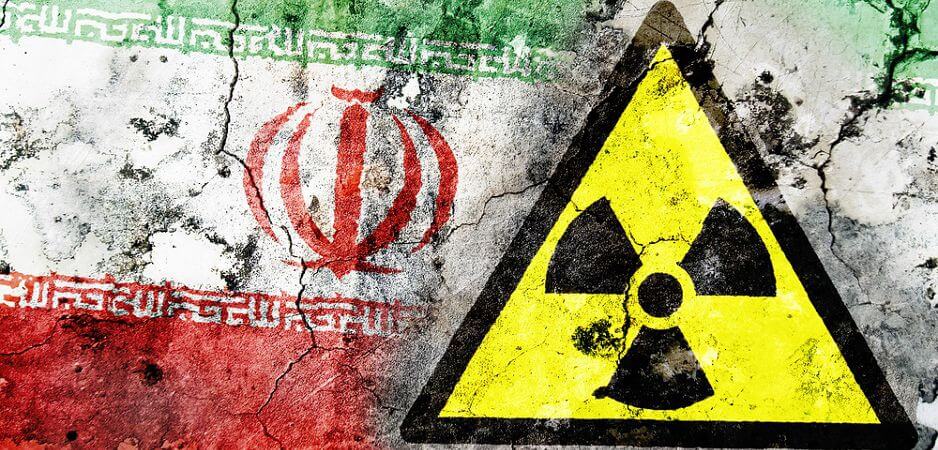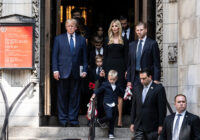If Europe is incapable of developing economic ties with the Islamic Republic, this could undermine Iran’s calculus to China’s benefit.
Donald Trump’s targeting of the Iran nuclear deal could have a bigger impact than once thought. Not only could this spark a nuclear arms race in the Middle East, but it could also tilt European-Chinese competition for the domination of Eurasia’s future energy infrastructure in Beijing’s favor.
As Trump keeps the world in suspense by declining to disclose how he intends to correct what he calls an embarrassment, Iranian leaders are betting against the odds that European signatories of the nuclear agreement will persuade him to stop short of pulling out of the nuclear deal and avoid steps that would effectively undermine the accord. In doing so, Iranian President Hassan Rouhani is relying on common interests with Europe: a desire to keep the deal in place; prevent Iranian hardliners from getting the upper hand in his country’s power struggles; avoid a nuclear arms race; and ensure a European role in shaping the future architecture of Eurasian energy.
However, if President Trump’s record is anything to go by, he is unlikely to heed European calls for keeping the nuclear deal in place, much like he ignored pressure from Europe and others not to pull out of the Paris Climate Agreement. A more likely scenario is that Trump will refuse to certify Iranian compliance with the deal by October 15, a quarterly requirement mandated by Congress. That would open the door to Congress re-imposing secondary sanctions lifted as part of the accord.
Renewed secondary sanctions would put Europe in an impossible position. They would not only put European companies and banks at risk of running afoul of US law if they continued to do business with Iran, but also unleash consequences that could significantly increase tension in the Middle East and ripple across Eurasia. De facto European compliance would significantly weaken the agreement’s value to Iran; boost pro-China hardliners in Iran who are opposed to the deal and eager to free the country from restrictions on its nuclear program; risk a nuclear arms race in an environment in which the US is losing out in the Middle East’s quest for nuclear energy that contains tacit building blocks for programs to develop nuclear weapons; and potentially tilt Iran toward China in determining the flow of its natural gas — a key factor in the quest to shape the future architecture of Eurasian energy.
Ali Akbar Salehi, the head of Iran’s Atomic Energy Organization, said “if the U.S. leaves the treaty and Europe follows, then this deal will certainly collapse and Iran will go back to what it was before and, technically speaking, to a much higher level.”
The United States may be unprepared for the fallout of Iran pursuing an unfettered nuclear program, beyond its ability to tighten the economic screws, wield military power and support potential efforts to destabilize Iran in a bid to achieve regime change.
NUCLEAR ARMS RACE IN THE MIDDLE EAST
A group of former senior US government and military officials recently warned that the US, in the absence of a strategy to promote the peaceful use of nuclear energy, was lagging behind China and Russia in helping Middle Eastern states develop programs of their own. The officials cautioned that Trump’s failure to articulate a policy undermined “Washington’s ability to shape the highest standards of nonproliferation safeguards, safety, and security.” Noting that “the Middle East is in the process of going nuclear,” the officials went on to say that “the big question is whether the nuclearization of the region will be dominated by Russia and China, or by the host countries in partnership with the United States and its allies under a proven program that ensures absolute safety, security and standardization throughout the nuclear fuel cycle.”
Most Middle Eastern states are signatories to the Non-Proliferation Treaty (NPT). They have disavowed the pursuit of nuclear weapons and called for a nuclear-free zone in the region in a bid to force Israel to declare its nuclear weapons and join the NPT and at the same time avert a nuclear arms race with Iran.
Saudi cooperation with nuclear power Pakistan has, nonetheless, long been a source of speculation about the kingdom’s ambition. Pakistan’s former ambassador to the United States, Husain Haqqani, has previously asserted that Saudi Arabia’s close ties to the Pakistani military and intelligence during the anti-Soviet jihad in Afghanistan in the 1980s gave the kingdom arm’s length access to his country’s nuclear capabilities.
In a report earlier this year, the Washington-based Institute for Science and International Security said it had uncovered evidence that future Pakistani “assistance would not involve Pakistan supplying Saudi Arabia with a full nuclear weapon or weapons; however, Pakistan may assist in other important ways, such as supplying sensitive equipment, materials, and know-how used in enrichment or reprocessing.” The report said it was unclear whether “Pakistan and Saudi Arabia may be cooperating on sensitive nuclear technologies in Pakistan. In an extreme case, Saudi Arabia may be financing, or will finance, an unsafeguarded uranium enrichment facility in Pakistan for later use, either in a civil or military program.”
Rather than embarking on a covert program, the organization predicted that Saudi Arabia would, for now, focus on building up its civilian nuclear infrastructure as well as a robust nuclear engineering and scientific workforce. This would allow the kingdom to take command of all aspects of the nuclear fuel cycle at some point in the future. That process could accelerate if US actions undermine the nuclear agreement with Iran.
In recent years, Saudi Arabia has significantly expanded graduate programs at its five nuclear research centers as part of a $100-billion program to build 16 nuclear reactors by 2030. In March, King Salman signed an agreement with China over cooperating on nuclear energy. The deal is for a feasibility study for the construction of high-temperature, gas-cooled (HTGR) nuclear power plants in the kingdom, as well as cooperation in intellectual property and the development of a domestic industrial supply chain for HTGRs built in Saudi Arabia. The agreement was one of a number of nuclear-related understandings concluded with China in recent years. Saudi Arabia has signed similar agreements with France, the United States, Pakistan, Russia, South Korea and Argentina.
IRAN AND THE IMPACT ON EURASIA
Lurking in the background of the battle for the future of the Iranian nuclear agreement is an unrelated but no less important issue: the future of Eurasia’s energy architecture. US efforts to undermine the deal and de facto European compliance with US sanctions could push Iran to favor China rather than Europe in allocating its estimated surplus over the next five years of 24.6 billion cubic meters of natural gas. Iran boasts the world’s second largest natural gas reserves and its fourth largest oil reserves.
“Not enough to supply all major markets, Tehran will face a crucial geopolitical choice for the destination of its piped exports,” said energy scholar Micha’el Tanchum. “Iran will be able to export piped gas to two of the following three markets: European Union (EU)/ Turkey via the Southern Gas Corridor centering on the Trans-Anatolian Natural Gas Pipeline (TANAP), India via an Iran-Oman-India pipeline, or China via either Turkmenistan or Pakistan. The degree to which the system of energy relationships in Eurasia will be more oriented toward the European Union or China will depend on the extent to which each secures Caspian piped gas exports through pipeline infrastructure directed to its respective markets.”
The lifting of international sanctions as part of the nuclear agreement gave Iran a vested interest in deploying its energy wealth in ways that would allow it to balance its relations with China and Europe. A Europe incapable of developing economic ties with the Islamic Republic, including the expansion of pipeline infrastructure, could undermine Iran’s calculus to China’s benefit.
The views expressed in this article are the author’s own and do not necessarily reflect Fair Observer’s editorial policy.
Photo Credit: MyImages – Micha / Shutterstock.com
Support Fair Observer
We rely on your support for our independence, diversity and quality.
For more than 10 years, Fair Observer has been free, fair and independent. No billionaire owns us, no advertisers control us. We are a reader-supported nonprofit. Unlike many other publications, we keep our content free for readers regardless of where they live or whether they can afford to pay. We have no paywalls and no ads.
In the post-truth era of fake news, echo chambers and filter bubbles, we publish a plurality of perspectives from around the world. Anyone can publish with us, but everyone goes through a rigorous editorial process. So, you get fact-checked, well-reasoned content instead of noise.
We publish 2,500+ voices from 90+ countries. We also conduct education and training programs
on subjects ranging from digital media and journalism to writing and critical thinking. This
doesn’t come cheap. Servers, editors, trainers and web developers cost
money.
Please consider supporting us on a regular basis as a recurring donor or a
sustaining member.
Will you support FO’s journalism?
We rely on your support for our independence, diversity and quality.






